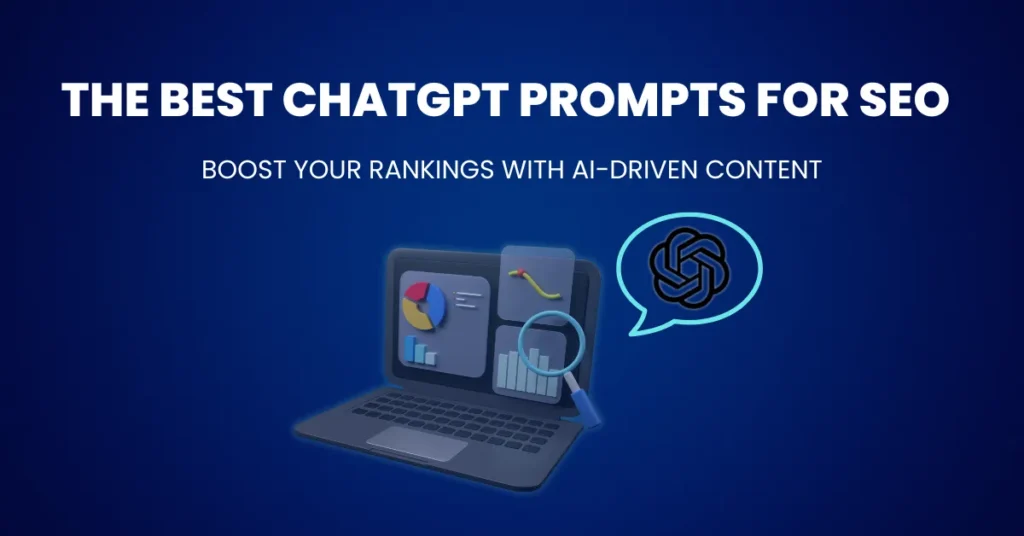Unlock the Best ChatGPT Prompts for SEO to Boost Your Rankings
Writing high-quality SEO content is a never-ending grind. We spend hours compiling keyword lists and researching topics to produce blog posts, yet there’s no guarantee of ranking. If you’re facing the same problem, you’re not alone.
Is there a tool that can help you create SEO-friendly content faster while ensuring you follow best practices? The answer is yes, because you have ChatGPT.
For marketers, content creators, and solopreneurs who have great content ideas but struggle even to craft meta descriptions that capture clicks, this challenge can become chronic. It’s tough to consistently create optimized posts that genuinely resonate with your target audience’s needs.
You’re lucky to have ChatGPT at your fingertips. With ChatGPT prompts for SEO, you can unlock your creativity and create high-quality, SEO-optimized content in seconds, not minutes. From generating topic ideas to enhancing readability and improving rankings, ChatGPT elevates your creative process to the next level, enhancing both your content and SEO strategies.
In this post, we will explore not only some of the best but also the most powerful ChatGPT prompts to fuel your SEO rankings and streamline your content creation process. No more struggling with SEO tasks or wasting time—let’s unlock ChatGPT’s full potential together!
AI in Web3 Content Creation: A Revolution Unfolding
How ChatGPT Enhances Your SEO Strategy
Let’s be real—SEO can be overwhelming. You’ve got to juggle keywords, content ideas, meta descriptions, and all that technical stuff, and even then, results aren’t guaranteed. But what if there was a way to make all that easier, faster, and way more effective?
That’s where ChatGPT comes in.
ChatGPT isn’t just another tool—it’s like having an SEO expert by your side, ready to help you with almost every aspect of your SEO strategy. Need help brainstorming blog post ideas? Done. Looking to optimize your meta descriptions? ChatGPT’s got you. Want to make sure your content ranks higher? It can help you write SEO-friendly content in no time.
With ChatGPT, you don’t have to waste hours researching or stressing over your next post. It makes your SEO process smoother, smarter, and way more efficient—so you can spend more time doing what you love and less time stuck in the SEO grind.
Ready to let ChatGPT take your SEO strategy to the next level? Let’s get to work!
Improve Voice Search Rankings with ChatGPT
ChatGPT helps us optimize our blog posts for voice search in a matter of seconds. We need to set our tone to be conversational and natural, so our content reflects that. With ChatGPT, we can create content for our audience. ChatGPT suggests the questions people are asking and helps create FAQ-style content, delivering relevant answers in a quick, clear, and concise way—perfect for Google to pick up for voice search.
If you want to rank higher for voice searches, ChatGPT has your back. It’s always ready to boost your rankings by crafting content that’s optimized for voice search assistants like Siri or Alexa.
Ready to get ahead of the game? Let’s fine-tune your content for voice search and watch your rankings soar!
Streamlining SEO Tasks with ChatGPT Automation
SEO is an unending process, and repetitive tasks eat up your time. Luckily, ChatGPT can automate these tasks, letting you focus on more critical parts of your SEO strategy. Here’s how ChatGPT can make your work easier:
ChatGPT’s Role in Automating Repetitive SEO Tasks
SEO can involve numerous repetitive tasks that are crucial but time-consuming, such as writing meta descriptions and alt text for images. Instead of handling these manually, ChatGPT can help automate them and save you some effort.
For example, if you need a meta description, you could ask ChatGPT:
“Can you generate a meta description for this blog post about vegan meal prep ideas, including the keyword ‘easy vegan meal prep’ and keeping it under 160 characters?”
ChatGPT will generate a concise description that includes the keyword and adheres to the correct word count, making it easy to integrate directly into your site.
The same goes for alt text. If you need a description for an image, you could say:
“Write alt text for the provided image of a healthy vegan breakfast, using the keyword ‘healthy vegan breakfast’ and keeping it under 125 characters.”
ChatGPT will provide alt text that’s clear, keyword-optimized, and within the perfect length, making sure your content is both accessible and SEO-friendly.
With ChatGPT handling these tasks, you can ensure everything is optimized, eliminating the need for repetitive work. It’s an easy way to boost your site traffic with negligible effort.
Prompts to Automate Content Optimization for Large Websites or E-Commerce Stores
Managing a large website or an e-commerce store means handling a lot of pages, and optimizing each one manually can quickly become overwhelming. This is where ChatGPT can really help. By automating certain tasks.
For example, if you have a series of new products to add to your store, you can ask ChatGPT to generate SEO-optimized product descriptions. Simply prompt:
“Generate SEO-optimized product descriptions for these 10 new vegan snacks.”
ChatGPT will create well-written, keyword-targeted descriptions for each product, making them SEO-friendly and ready to be published. This saves you the time it would take to write each description from scratch while ensuring the content is still fresh and optimized for search engines.
You can also use ChatGPT to automate other content tasks like creating blog post outlines, headers, and even product page content. Just provide ChatGPT with the necessary details, like the topic or product name, and it will generate the content for you, making your workflow much smoother and more efficient.
By using ChatGPT to automate these processes, you can maintain high-quality content across multiple pages without getting bogged down by the workload.
The Benefits of AI-Driven Automation in Saving Time While Maintaining SEO Quality
When you have a lot of content to optimize, such as writing meta descriptions, alt text for images, or product descriptions, doing it all manually can take up a lot of time and effort.
ChatGPT automates these tasks, which means you don’t have to spend hours on them.
The key benefit here is consistency. ChatGPT ensures that your content is optimized correctly across your entire site, which helps maintain high SEO quality without you having to do everything manually. For example, every meta description and product description will follow the same SEO standards, making your content more cohesive and helping it rank better on search engines.
By automating these repetitive tasks, you prevent burnout and can allocate your energy to tasks that require more creativity or deeper strategy. This AI-driven approach not only saves you time but also helps you maintain SEO quality without the stress of doing everything by hand.
Improving Readability and User Experience
Creating content that ranks well and engages readers is key to SEO success. While search engine optimization is important, making sure your content is easy to read and interesting for your audience is just as crucial. Here’s how ChatGPT can help improve readability and user experience:
How ChatGPT Can Help Create Content That’s Both SEO-Friendly and Reader-Friendly
ChatGPT is great for writing content that works for both search engines and your audience. If you have a dense paragraph or long sentences, you can ask ChatGPT to simplify them while keeping your keywords intact. This way, you get content that’s optimized for SEO but still easy to read.
For example, you can prompt:
“Can you rewrite this paragraph to make it clearer, while still using the keyword ‘sustainable fashion’ and keeping it SEO-friendly?”
ChatGPT will help you make the content more readable while maintaining your SEO focus, improving the overall experience for both search engines and readers.
Prompts to Simplify Complex Topics and Improve the Flow of Content
Not every topic is easy to understand, but ChatGPT can help break down complex ideas into simpler, digestible language. Whether it’s a technical concept or a detailed product feature, ChatGPT makes it more approachable for your audience.
For example, you can ask:
“Can you simplify this explanation of blockchain technology for a general audience?”
ChatGPT will break it down into easy-to-understand sections, making your content more accessible and engaging for readers.
Structuring Content for Better User Engagement and Retention
A well-organized content structure keeps readers on your page longer, boosting engagement and reducing bounce rates. ChatGPT can help you create clear content by suggesting headings, bullet points, and other visual elements.
For example, if you’re writing a guide, you can ask:
“Craft an outline on vegan meal prep with sections, bullet points, and engaging headers?”
ChatGPT will give you a structure that makes your content easy to navigate and more engaging for readers.
Competitor Analysis with ChatGPT
Analyzing competitor content is key to boosting your SEO strategy. With ChatGPT, you can make this process easier and find ways to outrank your competitors. Here’s how ChatGPT can help with competitor analysis:
Analyzing Competitor Content and Discovering SEO Gaps
The first step in competitor analysis is figuring out what your competitors are doing well and where they’re falling short. ChatGPT can help you analyze top-ranking content and spot areas where their SEO strategy may be lacking.
For example, you can ask ChatGPT:
“Can you look at this top-ranking article on vegan meal prep and find any gaps or areas to improve?”
ChatGPT will identify places where competitors may not fully address user intent or use the best keywords, giving you the chance to fill those gaps with your own content.
Extracting Insights from Top-Ranking Content
After identifying your competitors’ strengths and weaknesses, ChatGPT can help you gather valuable insights. For example, you can ask:
“Give me the key points of top-ranking blog on sustainable fashion?”
ChatGPT will highlight what makes the content perform well, such as effective keyword use, structure, and how it engages the audience. This helps you understand why it ranks high and shows you how to improve your own content.
Crafting Content That Outranks Competitors
After analyzing your competitors and gathering insights, ChatGPT can help you create content that fills in the gaps and outranks them. For example, if a competitor’s article lacks detailed product recommendations, you can prompt ChatGPT:
“Create a blog post on vegan meal prep using the keyword ‘easy vegan meal prep,’ and include in-depth tips and product recommendations missing from top-ranking articles.”
ChatGPT will help you craft content that not only targets the right keywords but also goes beyond what competitors offer, providing more value and answering user questions in greater detail.
By using ChatGPT for competitor analysis, you can easily find opportunities to improve your content and stay ahead in the SEO race.
ChatGPT for Multilingual SEO
Optimizing content for multi-language websites can be a challenge, but ChatGPT can make it easier. Here’s how you can use ChatGPT for multilingual SEO:
Optimizing Content for Multi-Language Websites Using ChatGPT
When targeting multiple languages, ChatGPT can help create SEO-friendly content for each language. It can assist with translating and adapting content so it performs well across different regions.
Prompts for Generating Localized Content That Follows SEO Best Practices
A prompt for content that is culturally relevant and SEO-optimized in different languages, you can ask ChatGPT:
“Generate a Spanish version of this article on vegan meal prep, making sure it follows SEO best practices for the Spanish-speaking audience.”
ChatGPT will optimize your content for that language, using specific keywords and phrases that resonate with your target market.
Adapting SEO Strategies to Target Different International Markets
Every market has its own search behavior. With ChatGPT, you can craft SEO strategies for different regions. For example:
“What SEO strategies should I use for my German vegan food website?”
ChatGPT will help you with local SEO practices and suggest how to connect with your German audience effectively.
Content Refresh and Repurposing with ChatGPT
Updating and repurposing old content is a great way to boost your SEO and keep your posts relevant. Here’s how ChatGPT can help you with this:
How to Update and Repurpose Old Content for Improved SEO
Refreshing old content is an easy way to improve your SEO. ChatGPT can help by updating outdated info, improving keyword usage, and making the content more relevant. For example, you can ask:
“Can you update this vegan meal prep blog post with the latest trends and tips?”
ChatGPT will add fresh, SEO-friendly content to help your post rank higher and stay up-to-date.
Prompts to Expand or Rewrite Content to Improve Rankings
Old content sometimes needs more detail or a rewrite to rank better. ChatGPT can help you add more valuable information and optimize it for keywords. For example, you can ask:
“Can you expand this vegan meal prep article by adding more tips and keywords?”
ChatGPT will enrich the content and help you keep the right balance of keywords to improve your SEO.
Repurposing Content into Other Formats for Broader Reach
Repurposing content into different formats, like social media posts, videos, or infographics, helps you reach more people. For example, you can ask ChatGPT:
“Can you turn this vegan meal prep blog post into an Instagram post?”
ChatGPT will create a short, catchy version that’s perfect for social media, helping you expand your reach and drive more traffic.
Advanced ChatGPT Prompts for SEO Professionals
As an SEO professional, you can make the most of ChatGPT by customizing prompts to fit your specific needs. Here’s how:
Tailoring Prompts for More Specific SEO Needs
To make the most of ChatGPT for advanced SEO, you can customize prompts to focus on specific keywords, audiences, or content types. For example, you might ask:
“Write a blog post about the future of blockchain, using the keyword ‘blockchain technology trends’ for a tech-savvy audience.”
This helps ChatGPT create content that’s perfectly aligned with your SEO goals.
Integrating ChatGPT with Analytics Tools to Improve SEO Strategies
ChatGPT can work with analytics tools like Google Analytics or SEMrush to boost your SEO efforts. For example, you can prompt ChatGPT with:
“Based on the keyword data from SEMrush, help me optimize my blog post on vegan recipes to target high-volume, low-competition keywords.”
ChatGPT will use insights from these tools to optimize your content, ensuring your SEO strategy is more focused and effective.
Scaling SEO Efforts with ChatGPT to Boost Traffic and Rankings
When you need to scale your SEO strategy, ChatGPT can help you create content quickly across different platforms. For example, you can ask:
“Generate 10 blog post ideas on sustainable fashion with SEO-friendly titles and meta descriptions to increase organic traffic.”
Tracking and Monitoring SEO Performance with ChatGPT
ChatGPT can be a valuable tool for tracking and improving your SEO performance. Here’s how it can help:
Monitoring SEO Progress and Generating Performance Reports
ChatGPT can help you analyze your SEO progress by summarizing data from your analytics tools and creating performance reports. For example, you can prompt:
“Summarize the SEO performance of my site over the past month, focusing on traffic, keywords, and rankings.”
ChatGPT will organize the data and suggest areas of improvement.
Analyzing Traffic, Bounce Rate, and Engagement Metrics
To understand how your content is performing, you can ask ChatGPT to analyze key metrics like traffic, bounce rate, and engagement. For example:
“Can you analyze the traffic and bounce rate for my latest blog post on vegan recipes and suggest improvements?”
Using ChatGPT to Make Data-Driven Decisions for Future SEO Efforts
Once you’ve analyzed your SEO data, ChatGPT can help you make informed decisions for future content and strategy. You can prompt:
“Based on current SEO performance, suggest topics or keywords to target for my next blog post to boost organic traffic.”
ChatGPT will suggest content ideas and SEO strategies that align with the data, helping you optimize your efforts moving forward.
Conclusion
To wrap it up, ChatGPT is a great tool for boosting your SEO efforts. It helps you create content that’s both engaging and optimized for search engines, making sure you’re targeting the right keywords.
ChatGPT also makes it easier to monitor and improve your SEO performance by providing insights and helping you track progress. Whether you’re refreshing old content, crafting new posts, or analyzing your website’s performance, ChatGPT can streamline your SEO tasks and save you time.
By adding ChatGPT to your SEO strategy, you can work more efficiently and see better results in no time.
Looking for expert SEO guidance using ChatGPT? Let’s work together to take your SEO to the next level!


